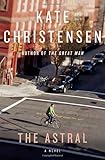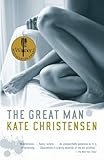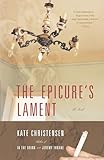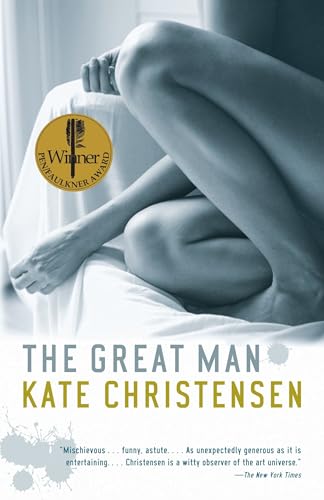

 In my household, Kate Christensen–the author of such sharp and fun novels as The Epicure’s Lament and The Great Man–is known as my husband’s second wife. I don’t mind; how can I fault my man’s impeccable taste? Christensen’s books are readable, the prose simultaneously unobtrusive and stylish, and her characters are deliciously flawed, rendered with humor and compassion. She’s a genius at depicting both losers and food in fiction (seriously, about the latter: I’ve cooked whole meals based on passages she’s written). After finishing her latest–and, in my opinion, her best–novel, The Astral (which is out today), I’ve decided that I don’t want to be Christensen’s sister-wife…I want to marry her myself.
In my household, Kate Christensen–the author of such sharp and fun novels as The Epicure’s Lament and The Great Man–is known as my husband’s second wife. I don’t mind; how can I fault my man’s impeccable taste? Christensen’s books are readable, the prose simultaneously unobtrusive and stylish, and her characters are deliciously flawed, rendered with humor and compassion. She’s a genius at depicting both losers and food in fiction (seriously, about the latter: I’ve cooked whole meals based on passages she’s written). After finishing her latest–and, in my opinion, her best–novel, The Astral (which is out today), I’ve decided that I don’t want to be Christensen’s sister-wife…I want to marry her myself.
When The Astral opens, failed poet Harry Quirk has been kicked out of his home. His wife Luz mistakenly believes he’s having an affair with his best friend Marion, and she won’t listen to his defense. Over the course of the novel, Harry wanders around his long-time neighborhood of Greenpoint, Brooklyn, trying to reckon with his floundering present. Luz has destroyed his latest book of poems. His daughter, Karina, is a Freegan. His son, Hector, has been in the clutches of a cult. Harry has no money, no job, no woman to anchor his days. The novel, by turns funny, sad and wise, is glittering with insightful and lovely descriptions, and Harry is so far my favorite fictional character of 2011: he’s complicated, stubborn, smart, foolish, vulnerable, and–man oh man–does he feel real.
The Millions: One of my favorite aspects of your novel is Harry Quirk’s first-person narration. Perhaps because he’s a poet, he gets away with crystalline imagery and clever turns of phrase, while still maintaining a conversational, natural voice. I was especially taken with his lists of adjectives, such as this memory of his estranged wife, Luz: “In bed, naked with me, she was kittenish, sinuous, carnal, darling, ravenous, generous, selfish, laughing, violent, intimate, cooing, and soft.” God, that’s fun to type out, and read aloud! Can you speak a little about what went into developing Harry’s voice?
Kate Christensen: Generally, my first-person-narrator characters start talking to me, haunting my skull with their voices, which are not my own, like barflies hanging around yakking about themselves until closing time. And the only way to exorcise them is to start typing what they’re saying and keep going till they shut up. After 300 pages, give or take, they generally seem satisfied and go away, never to return. It keeps happening – there seems to be no cure. And it’s a pleasure to let someone else take over for a while. I get tired of the sound of my own thoughts. Harry took me around the neighborhood where I’d lived for the greater part of 20 years, most of my adult life, the neighborhood I had just left behind forever. His poetic take on the world allowed me to say a kind of lyrical, lingering goodbye to all the places I knew so well and the shed skins of past selves.
TM: One can’t separate this novel from its setting: contemporary Brooklyn, and, more specifically, Greenpoint, where Harry has spent most of his adult life. The novel is peppered with many terrific descriptions of place; take this one, for instance: “I went through the intersection at Greenpoint Avenue, the dingy McDonald’s, defeated Starbucks, opposing Arab newsstands, and onto the old Associated Supermarket with its sexy Polish girls pouting at nothing as they rang up your groceries.” (And, by the way, as a lass of Polish descent, I thank you for all this talk of sexy.) How does Brooklyn, and Greenpoint in particular, shape Harry’s character? I recently read that you now live in New England. Was it easier for you to write New York once you left it?
KC: In a word, yes. In fact, I was writing about a lot of things I’d recently left behind… among them Brooklyn, a long marriage, and an ancient, ongoing, panicky sense of failure. I wrote this novel about a middle-aged failed poet hieing himself around north Brooklyn, hungry and lonely and filled with regret, yearning, and nostalgia, when I was in the throes of new love, living in Tuscany and Rome and the White Mountains, with a contract for my sixth novel, feeling incredibly lucky, fulfilled, and safe. Harry manifested something internal, something at the core of all this good fortune – no matter what the reason or outcome, having a long, very loving marriage end is shockingly painful. It’s like a death in life. Harry could express a lot of the things I was feeling even as my life pressed on. He and I needed to dwell together in that raw state of disbelieving grief. Harry stayed in Greenpoint for me, faced it all, grappled and wrestled and tried to solve the insoluble mystery of the death of love.
TM: The jacket copy of the galley says that you know “what secrets lurk in the hearts of men.” Pray tell, what are these secrets, and how do you know them? You’ve written a number of wonderful male characters over the years (Hugo Whittier from The Epicure’s Lament is perhaps the most beloved and memorable antihero in contemporary fiction). Do you approach creating male characters any differently than you do female characters?
KC: If I do know some of men’s innermost secrets, it’s only because I share them. Men can be curmudgeons, horndogs, misanthropes, selfish, rebellious, crafty, mischievous, and so forth and still be loved – boys will be boys, their foibles and faults can be charming and funny — but girls are another story entirely. So I couch all my most antisocial, unacceptable, non-feminine tendencies in male voices. But my own Id is flying from the topmast.
TM: The women in the novel—Luz, Harry’s daughter Karina, Harry’s friend Marion (with whom Luz accuses him of having an affair), and even Christa, Harry’s son Hector’s cult leader —are powerful, competent, opinionated, and self-sufficient. The men, by contrast, strike me as quite lost. Was this intentional? Can you speak about this difference?
KC: It’s not a general statement about men and women by any means. One of the themes I’m exploring in The Astral is the ways in which certain women control, or try to control, other people – their husbands first and foremost, and their children, and in one case, their clients, and in another, their followers. Luz, Lisa, Christa, and Helen all tend to attract men who want to be controlled, who need it on some level, either because it’s what they’re used to from their own mothers or because they lack the internal wherewithal to direct the course of their own lives. There are clusters of relationships around these four women in the novel, all of which are defined by this dynamic.
It was interesting for me to explore this dynamic fictionally because I relate to it so little and always find myself empathizing with the men who fall into such women’s grasps. I’ve had my share of encounters with controlling women. There’s a mechanism at work in them that is deeply foreign to me and which I sought to expose. So yes, on this level, it was completely intentional.
Karina and Marion, on the other hand, are Harry’s gatekeepers, loyal and protective and generous. They seek connection and truth rather than control and power, and therefore serve as the counterpoints to the other female characters in the novel.
TM: Much of the novel is obsessed with the past, and Harry’s longing for a lost time: when his marriage seemed to work, when his kids were young, and his group of friends was intact, before Brooklyn was fully gentrified. Even Harry’s preferences as a poet, for old-fashioned formal structures, speaks of his nostalgia for something that has faded. When you set out to write the book, did you know that this would be a story of man looking backward, and seeing the past anew?
 KC: From the opening sentences, Harry’s voice is steeped in the past. The germ of the novel was a man in late middle age, cast out of his home like an old Adam banished by his Eve from a comfortable, domestic Eden. The entire tenor of the book is shaped around this image of paradise lost, and Adam alone, humbled and brought low. His need to understand the past is intense and urgent; he’s a falsely-accused man hell-bent on proving his own innocence and discovering the actual perpetrator of the crime. The book was half inspired by Joyce Cary’s The Horse’s Mouth and half by the convention of detective noir in which the accused becomes the crime-solver by default, to clear his own name, and goes around interviewing anyone who can help him figure it out. Harry shambles around Greenpoint, hot on the trail of the cause of the death of love, inquiring and analyzing and picking up clues.
KC: From the opening sentences, Harry’s voice is steeped in the past. The germ of the novel was a man in late middle age, cast out of his home like an old Adam banished by his Eve from a comfortable, domestic Eden. The entire tenor of the book is shaped around this image of paradise lost, and Adam alone, humbled and brought low. His need to understand the past is intense and urgent; he’s a falsely-accused man hell-bent on proving his own innocence and discovering the actual perpetrator of the crime. The book was half inspired by Joyce Cary’s The Horse’s Mouth and half by the convention of detective noir in which the accused becomes the crime-solver by default, to clear his own name, and goes around interviewing anyone who can help him figure it out. Harry shambles around Greenpoint, hot on the trail of the cause of the death of love, inquiring and analyzing and picking up clues.
TM: I loved reading about Hector’s activities with the cult, which the book treats earnestly and compassionately, but not without a touch of humor as well—it’s hard not to laugh at people who rename themselves Lake and Bard. What kind of research, if any, did you do to write these sections? Just tell me: Have you ever been in a cult?
 KC: No, I haven’t, but my little sister was in a group called the Twelve Tribes for many, many years. About ten years ago, my mother and then-husband and I planned an intervention; the group discovered that we were planning it and blocked it from happening. For several years, we read every book on the subject and met with ex-members and cult exit counselors and also with Steve Hassan, an ex-Moonie and cult expert whose Combatting Cult Mind Control is the most interesting, enlightening, helpful book I’ve ever read about how cults work and why people join them.
KC: No, I haven’t, but my little sister was in a group called the Twelve Tribes for many, many years. About ten years ago, my mother and then-husband and I planned an intervention; the group discovered that we were planning it and blocked it from happening. For several years, we read every book on the subject and met with ex-members and cult exit counselors and also with Steve Hassan, an ex-Moonie and cult expert whose Combatting Cult Mind Control is the most interesting, enlightening, helpful book I’ve ever read about how cults work and why people join them.
I think it’s very easy to satirize cults without any experience of them or education about them, to portray cult members as wacked-out zombies and the cults themselves as one-dimensional jokes. I know too much, have experienced too much, to do anything but treat the entire subject with the earnestness and compassion it deserves – and humor as well, which was one way of coping with the pain and sadness of losing my sister for so many years. (As an aside, she came out of the group with her husband and four children the same week I finished writing The Astral.)
TM: Because this is The Millions, I have to ask: What was the last great book you read?
KC: Thomas Bernhard’s The Loser.








